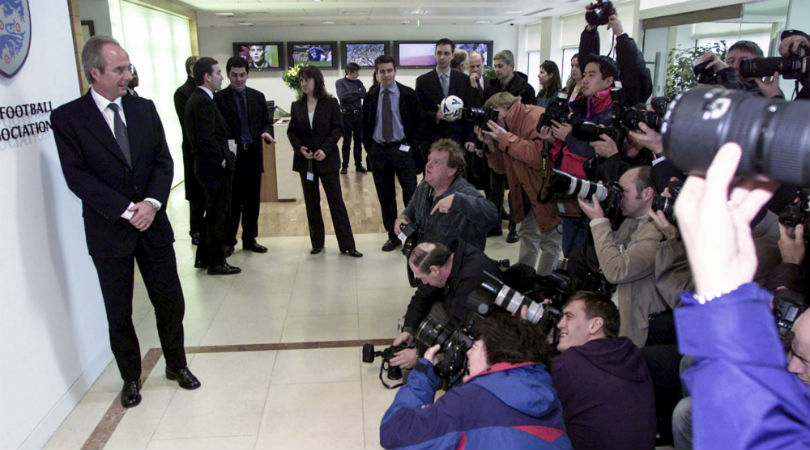
“No, I never was a hammer-thrower,” the late Sven-Goran Eriksson told us in 2016 down a phone line from a holiday in Panama, he started to laugh. “But oh yes, I remember them saying I was.”
After being appointed as England boss in 2001, the Swede was put in the difficult position of dealing with the reaction to his appointment as the Three Lions’ first foreign manager - or rather, the overreaction to it from certain sections of the press.
“I guessed some of them weren’t going to be my friends,” he told FourFourTwo. “I didn’t read much of it. I thought it’d be better if I didn’t.”
For a while, that seemed to be the safest course of action. In the three months between Kevin Keegan’s resignation in a Wembley toilet and Eriksson’s first day at work in Soho Square, a group of former international players, football administrators, journalists and supporters queued up to knock down the notion of England looking abroad. At the start, even Eriksson concurred.
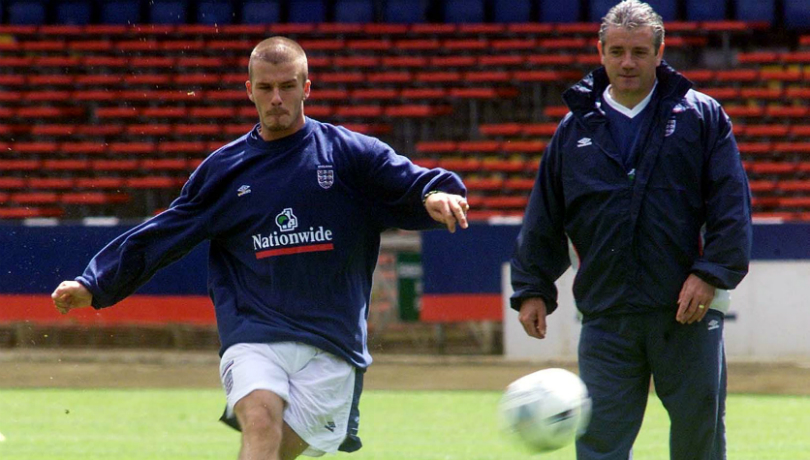
“I spoke to my agent, Athole Still, very soon after Germany beat England in the final game at the old Wembley [in October 2000],” he recalls. “He said: ‘Would you be interested in being England manager?’ I said: ‘That’s a joke – no foreigner could take England.’ Two days later he said it was possible and I said I was interested. Then it all moved very quickly.”
October 31, 2000 – the date the deal was confirmed – proved a scary Halloween night for the FA. Chief executive Adam Crozier may have considered the hiring of Eriksson a neat trick, but there were few treats in store when a late-night knock on the door brought the delivery of the next day’s first editions to Lancaster Gate.
He said: ‘Would you be interested in being England manager?’ I said: ‘That’s a joke – no foreigner could take England’
“What a climbdown. What a humiliation. What a terrible, pathetic, self-inflicted indictment,” fulminated The Sun.
Worse came in another piece which derided the FA’s “smarty-pant spin doctors” before heading into orbit. England fans, claimed Jeff Powell of the Daily Mail, “wanted Terry Venables, and rather than Gianni Foreigner I believe they would have settled for Billy Anybody.
"Yet, we sell our birthright down the fjord to a nation of seven million skiers and hammer-throwers who spend half their year living in total darkness.”
The negative reaction to a foreign manager didn’t come as a surprise to Eriksson or his agent. “Sven and I had realised from the start it would be inevitable; nor do I think Sven took it personally,” Athole Still told FFT. “We accepted there would be a general feeling against any foreigner.”
Yet the pair underestimated exactly how stridently that feeling would be expressed.
“I really didn’t expect the pressure from the press,” said Eriksson. “That was the surprise, not the pressure of the football job, because I was in Italy and if you don’t win games there they kill you.”
Perhaps some of the shock came from the fact that the Lazio coach arrived as the FA’s choice almost from nowhere. In the hours after Keegan’s resignation on October 7, Eriksson had not even appeared among the top 15 candidates in the first bookmakers’ odds for a permanent successor. Ahead of him were the likes of John Gregory, Peter Reid, Bryan Robson, Alan Curbishley and David O’Leary. Former England managers Terry Venables and Bobby Robson led the field.
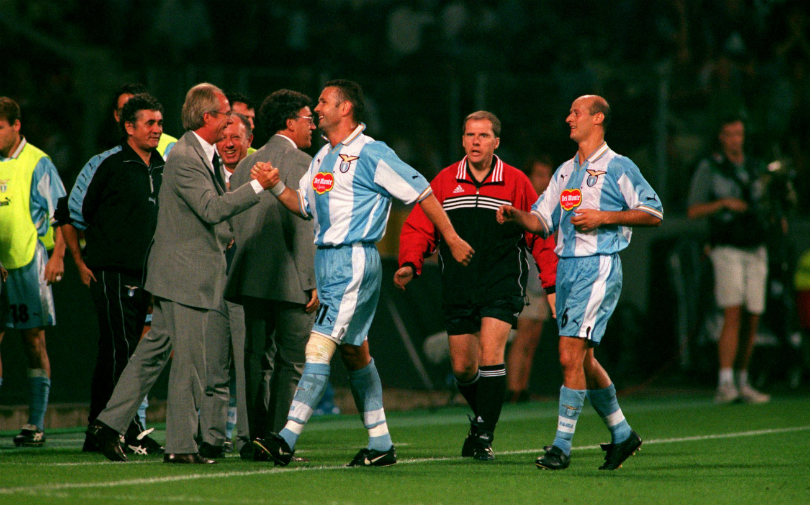
But the FA had very different ideas. A former employee who spoke to FourFourTwo recalls the shaken England party flying from London to Finland for their next match and seeing the international committee – among them, recently installed FA chief executive Crozier, Arsenal’s David Dein, Leeds’ Peter Ridsdale and committee chairman Noel White – poring over a flipboard on which the most prominent name seemed to be Johan Cruyff.
Meanwhile FA technical director Howard Wilkinson and Les Reed, in caretaker charge of the team after Keegan’s shocking departure, were thought to be in favour of reaching out to Fabio Capello.
What soon became clear to those on the inside, if not initially to those on Fleet Street, was that England’s next manager would not be an Englishman. Venables came with baggage and FA enemies. Even before a poor goalless draw with the Finns on October 11, Wilkinson was a non-starter after declaring England – now bottom of Group Nine – should focus on 2006.
Roy Hodgson had meanwhile blotted his copybook with a disastrous spell at Blackburn, while Robson was coveted by Ridsdale but eventually viewed as too difficult to prise away from Newcastle United, even in a part-time role that would pair him with a younger man such as Peter Taylor.
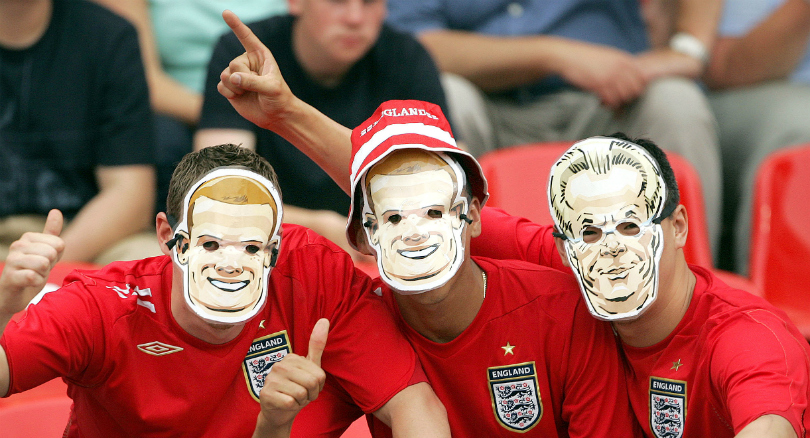
Besides, Crozier was after a groundbreaking signature move that, along with the FA’s imminent switch from fusty Lancaster Gate to fashionable Soho Square, would define his first year in charge.
Snatching one of the Premier League’s top managers would certainly do that, but it was correctly supposed that Sir Alex Ferguson would not be interested and that Dein would resist moves for Arsene Wenger. Both Dein and Crozier had another name in mind.
Still said: “David Dein, who was influential on the international committee, was a big supporter of Sven from the start, and though an element of that was probably protecting his interests at Arsenal from losing Arsene Wenger, he recognised Sven’s qualities.
"One part of that was that as a Swede he was seen as politically neutral. Even if England had been able to appoint Arsene Wenger, there would still have been an element who would have baulked at having a Frenchman. It certainly couldn’t have been a German.”
Even a rising member of the national squad had his say. “The England team should be managed by an Englishman,” declared one David Beckham
Crozier had also been pro-Eriksson virtually from day one, especially after Ferguson gave his nod of approval to the man who almost replaced him at Manchester United a couple of years later, before the Scot rescinded his plan to retire.
“I met Adam Crozier, David Dein and Athole Still in Rome,” revealed Sven. “And I realised that I could not say no; that if I did I would regret it for the rest of my life.
But as Eriksson’s name began to creep into the press and Crozier began negotiations with Lazio president Sergio Cragnotti, the resistance began.
Jack Charlton, who led the Republic of Ireland to three international tournaments despite hailing from Ashington in north-east England, called the idea of hiring a foreigner 'a recipe for disaster'. His old Newcastle fishing partner Paul Gascoigne told the papers: “It would be an embarrassment for English soccer.”
Trevor Francis reminded the FA that instead of looking overseas, 'there are some excellent English coaches in the Nationwide League' – as the EFL was then known. At the time these included Sam Allardyce, Neil Warnock, Gary Megson…and Trevor Francis.
Even a rising member of the national squad had his say. “The England team should be managed by an Englishman,” declared one David Beckham.
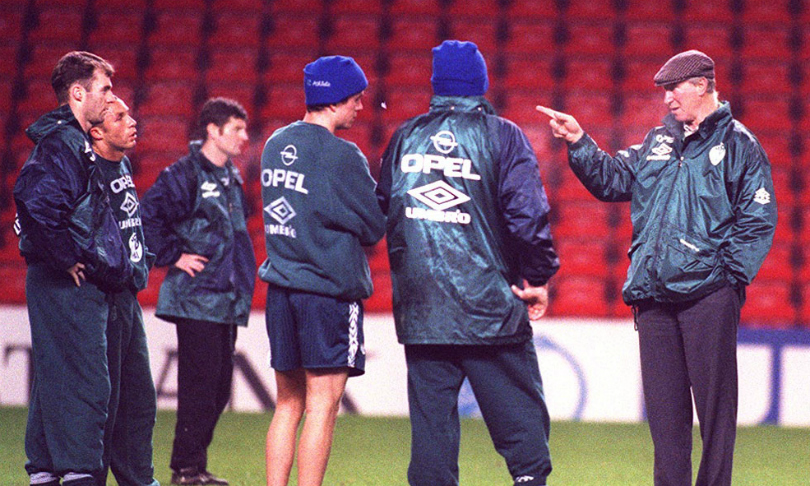
Of all the press voices lining up against the appointment, none was more strident than Jeff Powell, a long-time admirer and friend of Venables.
Eriksson’s biographer Joe Lovejoy said: “Jeff was very much the leader of the pro-Terry camp. A lot of us also wanted Venables, but Terry was doomed in that he had a dyed-in-the-wool enemy in Noel White, who had said ‘over my dead body’.”
When FFT once asked Powell about his flawed grasp of Swedish topography and sporting pursuits, his twinkly-eyed response was: “I was right about Sven, though, wasn’t I?”
The nascent internet football community marvelled at the piece, which included Powell’s bizarre suggestion that the appointment had hastened the arrival of 'third-world Britain'; that 'one more week and we shall be stockpiling petrol and hoarding food'.
The pushback to the pushback
The Daily Telegraph’s Alan Tyers, then working at startup website Football365, said: “I remember the whole piece being amazing and us condemning it but also enjoying laughing at it.
"It felt at the time that there was a type of football writing emerging on the internet that was not in any way represented in the papers, where it was still guys like Jeff Powell handing down these opinions in tablets of stone and you just thought: ‘What on Earth is he on about? Hasn’t he noticed that England have had a succession of English managers who have been completely hopeless?’
“It felt like a watershed moment to us; that the top journalists were completely out of touch with ordinary supporters. It seemed like the newspapers were the extreme and the internet was the voice of reason and calm, which is not really the way it’s turned out.”
Eriksson did have his supporters in the national press, notably Patrick Collins of the Mail On Sunday, who railed against the response from “the Friends of Terry Venables”, lamenting that 'one loyalist was responsible for an eruption of puerile xenophobia whose natural home was the lavatory wall'.
Yet the appointment was drawing wider criticism, too. “The appointment of a foreign coach beggars belief. This is another example of us giving away our family treasures to Europe,” said League Managers Association head and former Wolves boss John Barnwell.
“It’s a betrayal of our coaching structure,” said PFA chief executive Gordon Taylor, claiming: “Terry Venables is not considered because they have put criteria down that maybe the Archbishop of Canterbury wouldn’t meet.”
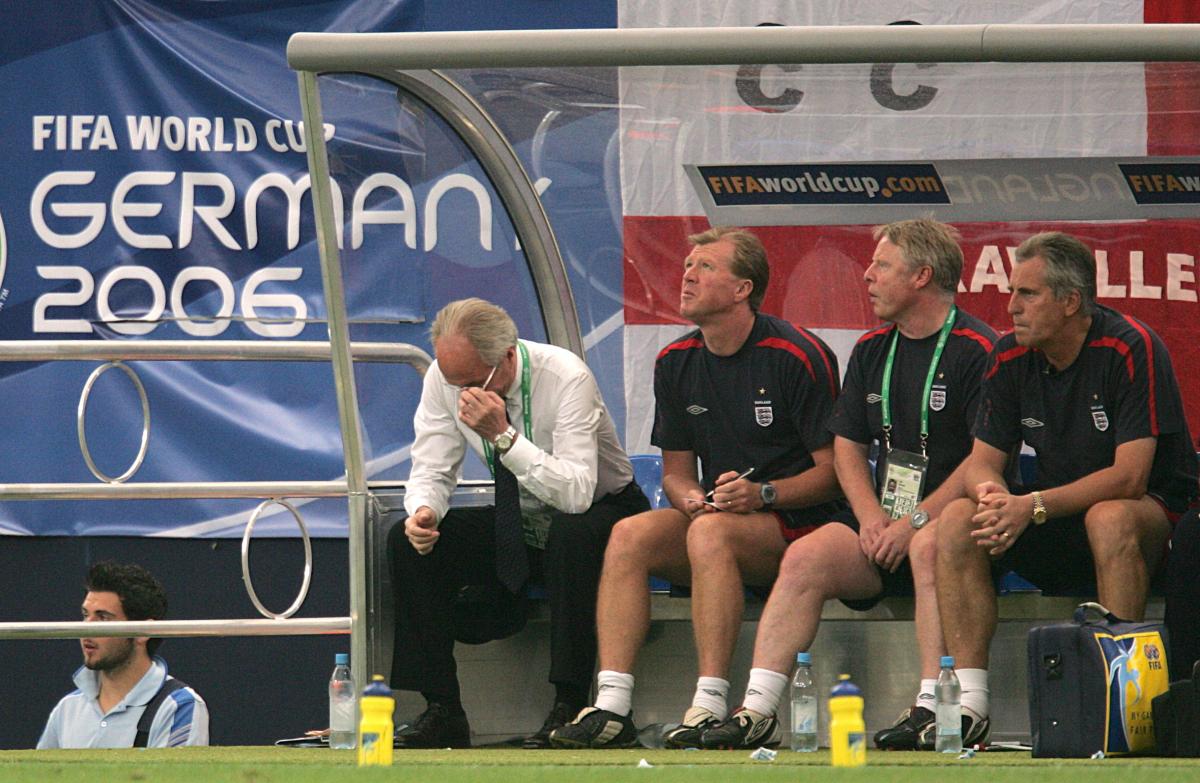
Then there were the fans. “I saw the protesters saying ‘we don’t want a foreigner’ and I didn’t really feel affected by that,” said Eriksson. “I always thought that if I did a good job the English people would be supportive.
"I had five-and-a-half years there and I never met any rude or abusive English football fans. Almost everything negative was from the press. There was a big difference between the English fans and the English press.”
In his first visits to England, Eriksson was followed by Ray Egan, a retired police officer from the Midlands prone to dressing as John Bull. Back then, recalls Eriksson, 'he held a placard saying the English people should hang their heads in shame for having hired a foreigner'.
“It didn’t bother me. It was only one person,” said Sven. In reality, the opposition was more widespread than he believed.
“I distinctly remember seeing the Ten O’Clock News headline and shouting ‘No!’ at the television,” said home-and-away England supporter Dean Cornish.
“It may sound parochial, but as a patriotic Englishman I just couldn’t bear it. It’s not just English arrogance; I genuinely believe that international football is just that – the best in football one country can offer versus the best another country can offer.
"I’d probably think it was cheating if the kit man was a laundry specialist from Sweden, let alone the manager. I felt that if we won something under Eriksson, then it would be tarnished in some way, and I think most England fans felt the same.”
The opposing sides met in St Albans on November 2nd 2000, the new man flying into Luton by private jet so he could return to Rome for Lazio training that afternoon. His inaugural press conference, at plush Sopwell House, was packed.
When the tabloids demanded he named Leicester’s keeper and Sunderland’s left-back (England hopefuls Ian Walker and Michael Gray), Eriksson played a straight bat, refusing to say little other than that he felt England could still qualify for the World Cup finals.
“I was glad when it was over,” Eriksson later wrote, although it wasn’t quite – with Remembrance Sunday looming, the FA gave their new coach a poppy to wear as he met the media. It was derided as tokenism by the next day’s Daily Express.
With Eriksson initially agreeing to wait out his remaining contract at Lazio while Peter Taylor and Steve McClaren looked after England, he had still not met his players, and skipped the opportunity ahead of a lacklustre 1-0 friendly defeat in Turin on November 15. Even without personal contact, though, the man who would become his captain had revised his opinion.
“It should be good – it will be good,” said Beckham. “We have got many good players and they will become a good team. He is a great manager.”
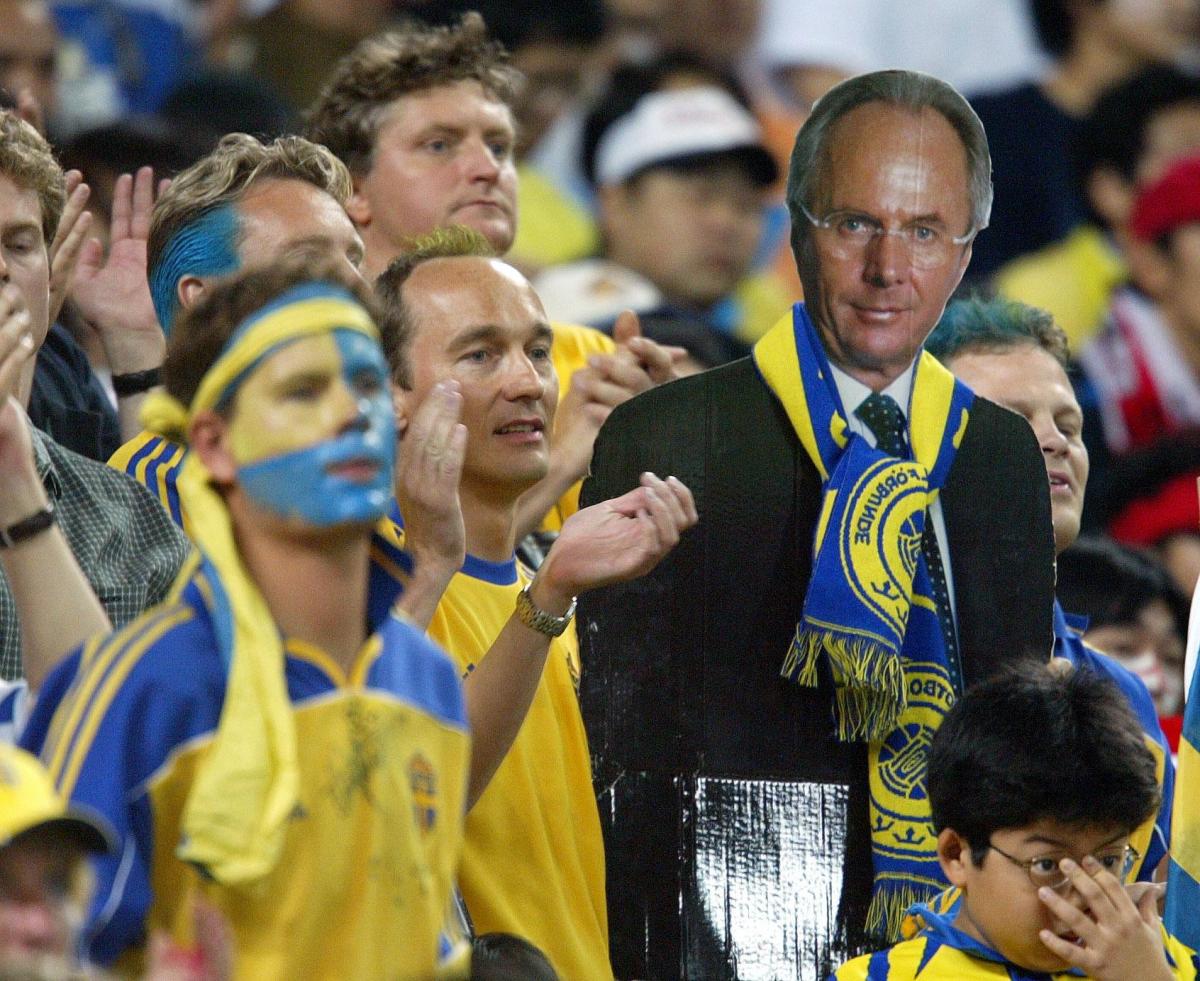
Winning hearts and changing minds
While the FA waited for Eriksson (although in the end, poor results at the Serie A club including a run of five defeats in eight games meant he was free by early January), they tried to change minds in the media.
“There was a fair bit of briefing from David Davies and a lot of it directly from Adam Crozier, who was very clever with us – you would say manipulative,” said biographer Lovejoy.
Eriksson’s first official day in charge included a trip to see West Ham play Sunderland, the beginning of a long series of cross-country trips shared with assistant Tord Grip.
Sven’s tour brought so many handshakes with fans that some wondered whether it was part of an FA love-bombing campaign, a feeling which intensified when the association’s website began publishing a ‘Sven Tracker’ so supporters could find out where he would pop up next.
Eriksson said: “It was totally my idea, because I thought it was the only way to do that job – to try to cover as many players as quickly as possible; as much ground as quickly as I could.
"I didn’t know everything about English football; of course I followed it and watched the players when I was in Italy, but not to that extent. I thought I should go to as many games and clubs as possible, and Tord could go in the other direction to see as much as we could. I did the same when I was manager of Mexico some years later.”
Athole Still added: “What people who don’t know Sven do not appreciate is that if he is not involved in a match, or if there isn’t a match on TV, he will be watching some under-12s play somewhere. He just loves watching football.”
Eriksson finally met the players before his first game in charge, in what turned out to be an encouraging 3-0 win against Spain at Villa Park. A core of young but influential believers quickly emerged - among them, Beckham, Rio Ferdinand and Frank Lampard.
“His nationality never bothered me,” said Andy Cole, who won the final five of his 15 England caps in the first 12 months of the Swede’s reign.
“The papers talked about him not being English, but I don’t think it was an issue with the other lads either. They were used to working for foreign managers. As long as he could speak English, they were OK with that. Players were more concerned about still getting picked.”
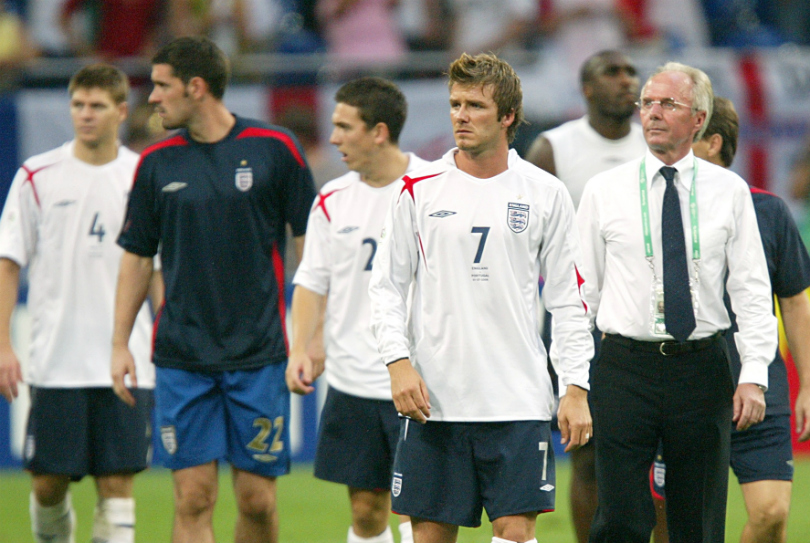
Eriksson explained he won the squad’s trust by asking them to do no more than they were already good at.
“You should make it as simple as possible,” he explained. “You see the players very seldom. Don’t complicate things. Put players in the positions they feel comfortable in, in a system they feel comfortable with. They responded with good performances quite quickly.”
Even at this early stage, those supporters who felt the England manager had to be English were coming onside.
“It seemed the press had had it in for Sven from day one,” said Dean Cornish. “At Villa Park the photographers crowded in front of him during the national anthem so that they could ‘catch’ him not singing God Save The Queen. He probably started wondering what he’d let himself in for.
“England fans always back the team and they were behind Sven from the start when it came to matches. There were fans wearing Sven masks. Once the media derision died down, there was support and excitement for him. I really grew to like him.”
If the Spain game was encouraging, the next international break, a month later, provided evidence that automatic qualification for the 2002 World Cup might still be possible after all. England beat Finland 2-1 on an afternoon when Anfield cheered a Beckham goal, then defeated Albania in Tirana. In June, England won in Greece to put themselves firmly back in contention.
“If there were critics remaining by that stage, they had shut up,” said the anonymous former FA employee. “We had a manager who was shaking hands at every ground, who the players loved and who was winning. His popularity then was immense.”
By the time Halloween rolled around again, thanks to unforgettable matches against Germany (a 5-1 victory) and Greece (a 2-2 draw), sandwiched by a professional win over Albania, England had qualified for the World Cup. Gordon Taylor, 'betrayed' a year earlier, compared Eriksson’s 'aura of stillness' to that of Sir Alf Ramsey.
Barnwell, so insulted on behalf of his LMA members when Sven was announced as national team coach, admitted: “Not one manager in the country would say anything detrimental about his approach or his attitude.” Newspaper headlines now included ‘Svennis From Heaven’ and ‘Svensational’.
It couldn’t last, of course. But while it did, an English football nation that seemed to have spent so much time in darkness was living in the light. “Those were great times – happy times,” said Eriksson. “I thought from when I came into it that it was a huge job, but beautiful. It is, and it was for me, every day.”
This feature originally appeared in the February 2016 issue of FourFourTwo. Get the latest issue now!







